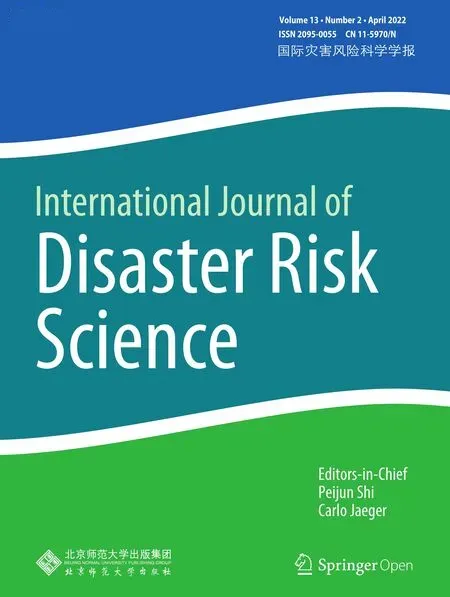International Journal of Disaster Risk Science
2023-01-16
TheInternational Journal of Disaster Risk Scienceis supervised by the Ministry of Education of the People’s Republic of China and supported by the National Disaster Reduction Center.
The Editorial Office is at the Academy of Disaster Reduction and Emergency Management, Faculty of Geographical Science, Beijing Normal University.
The journal is also supported by the State Key Laboratory of Earth Surface Processes and Resource Ecology, the Key Laboratory of Environmental Change and Natural Disasters of the Ministry of Education, and the Integrated Risk Governance Project Office.
Aims and Scope
TheInternational Journal of Disaster Risk Science(IJDRS) provides a pioneering platform for researchers and practitioners aiming at greater resilience and integrated risk governance in view of local, regional, and global disasters. IJDRS breaks new ground in research about disaster risks by connecting in-depth studies of actual disasters and of specific practices of disaster risk management with investigations of the global dynamics of disaster risks and theories and models relevant for advanced integrated risk governance.
The journal’s primary aim is to enable the disaster risk community to communicate, learn, and progress in order to improve the capacities for integrated disaster risk and resilience identifi cation, measurement, and governance at all scales.
IJDRS is an interdisciplinary English language journal that publishes research articles that are problem-driven and solution-oriented, providing insights on major disasters in a timely fashion and addressing theoretical and methodological issues in disaster risk science.
Topics
• Human dimensions of disaster risk
• Disaster risk governance and resilience
• Disaster risk and resilience indicators and measurement
• Global change and disaster risks
• Development and risk transition
• Empirical studies and perspectives on major disaster events
杂志排行
International Journal of Disaster Risk Science的其它文章
- Machine Learning-Based Evaluation of Susceptibility to Geological Hazards in the Hengduan Mountains Region,China
- Flash Flood Risk Assessment and Driving Factors:A Case Study of the Yantanxi River Basin,Southeastern China
- Risk Assessment of Tsunamis Along the Chinese Coast Due to Earthquakes
- Typhoon Risk Perception:A Case Study of Typhoon Lekima in China
- Carbon Emission Risk and Governance
- How Participatory is Participatory Flood Risk Mapping?Voices from the Flood Prone Dharavi Slum in Mumbai
